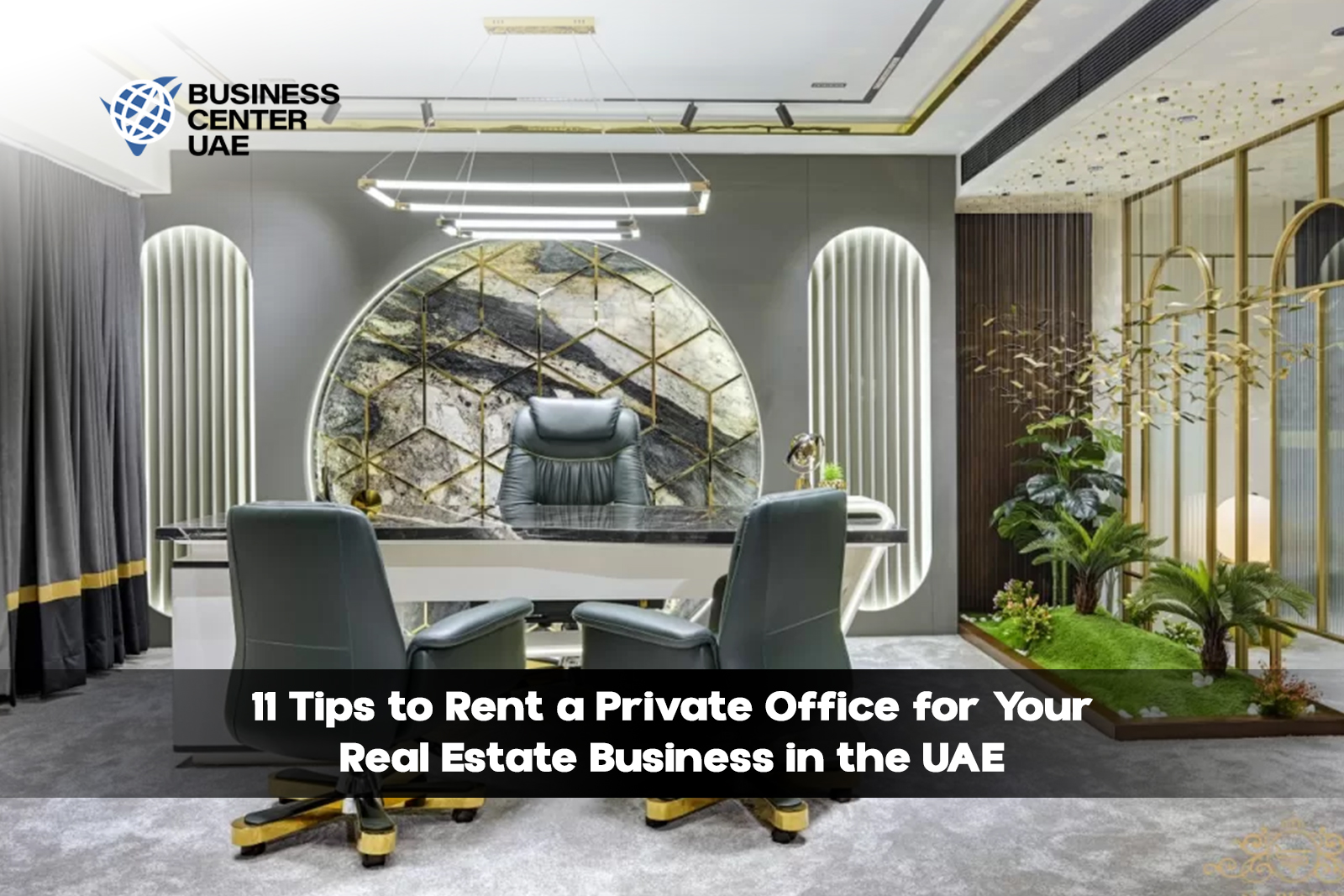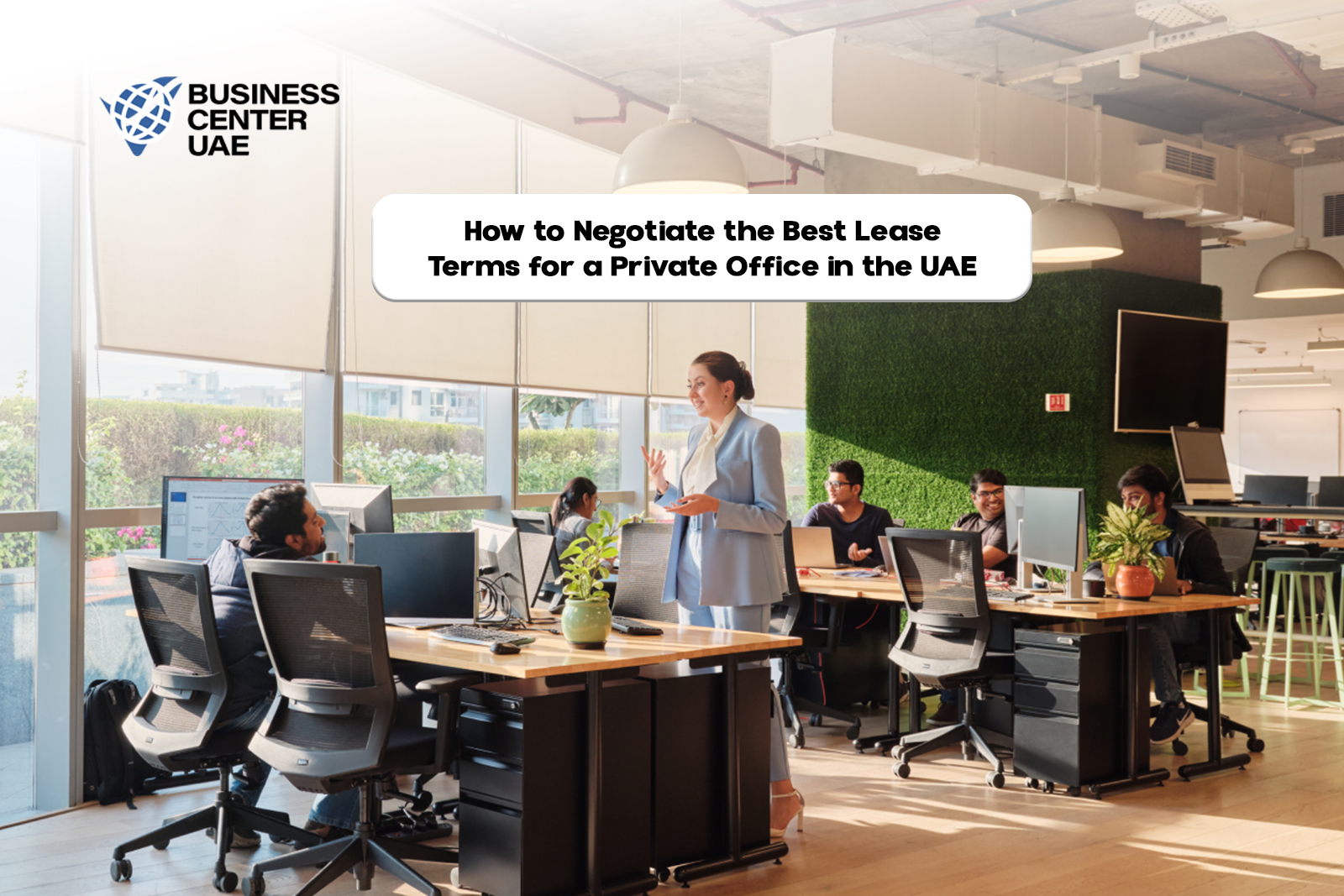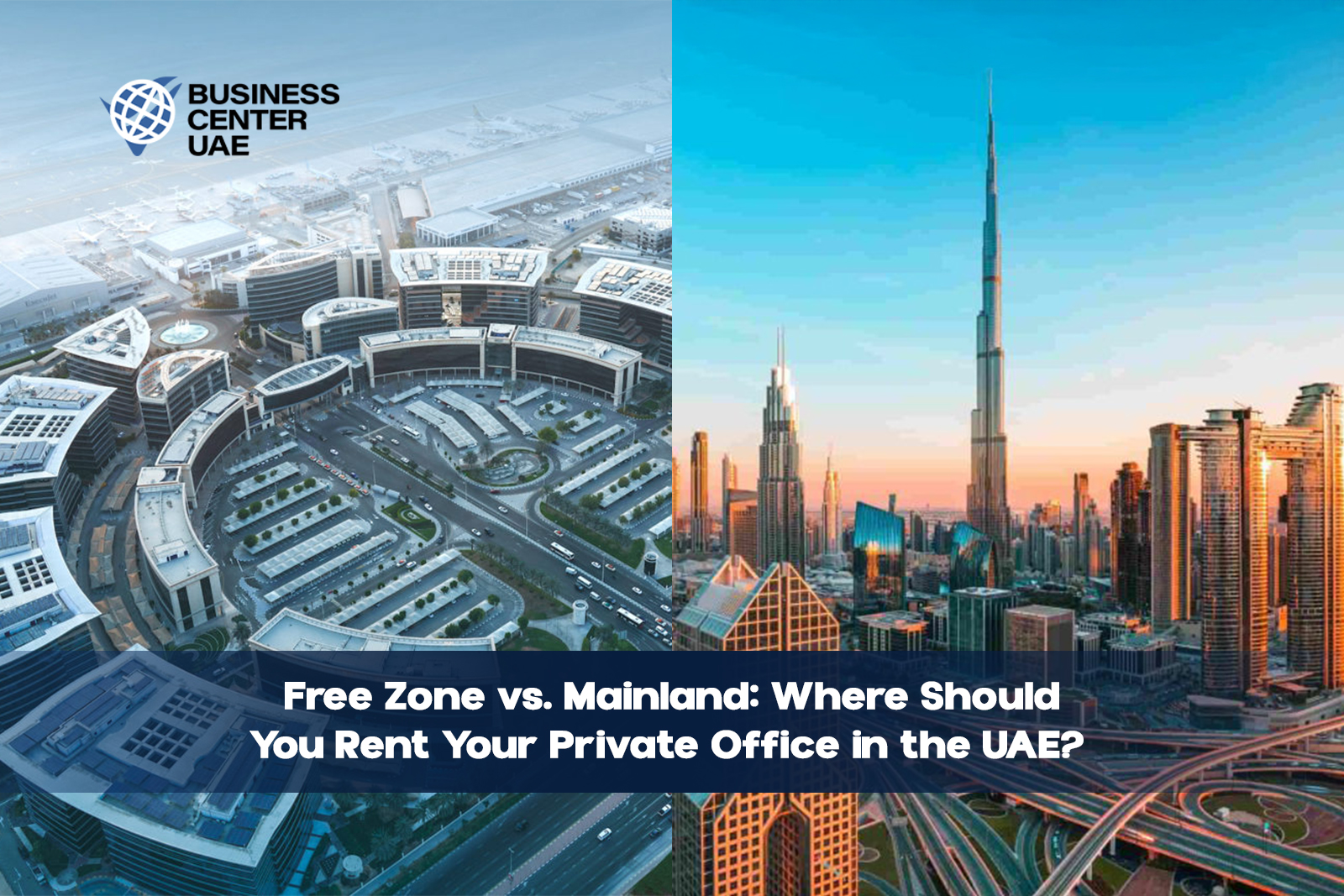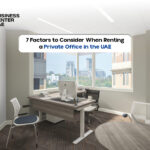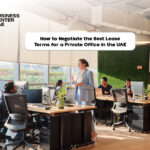Why Your Office Address Matters in the UAE
In the UAE, business isn’t just about what you do, it’s also about where you do it. The location of your office carries weight, credibility, and opportunities. For entrepreneurs and companies setting up in the Emirates, one of the most crucial decisions is whether to rent your private office in a Free Zone or on the Mainland.
But this isn’t a simple coin toss. The choice impacts everything, from licensing to taxes, from the type of clients you can serve to how easily you can scale. And with hundreds of options for office space for rent in the UAE, ranging from executive offices to serviced and flexible setups, the landscape can feel overwhelming.
This guide will break it all down- Free Zone office rental vs Mainland office rental in the UAE, giving you a detailed, practical, and interactive comparison so you can make the right choice for your business.
Understanding the Basics- Free Zone vs Mainland
What is a Free Zone in the UAE?
A Free Zone is a designated jurisdiction created to encourage foreign investment with attractive benefits like 100% foreign ownership, tax exemptions, and simplified regulations. Each Free Zone is managed by its own authority and is designed for specific industries (like media, tech, logistics, or finance).
When you opt for a Free Zone office rental in the UAE, you typically get access to:
- Licenses restricted to Free Zone and international business.
- Business center rentals or flexible office packages.
- Visa quotas tied to your leased office size.
What is the Mainland?
Mainland refers to the area governed by the UAE’s Department of Economic Development (DED). Businesses here can operate anywhere across the UAE and internationally.
When you choose a Mainland office rental in the UAE, you get:
- Freedom to trade across all Emirates and with local clients.
- More flexible leasing options (from executive offices to commercial spaces).
- Greater visa allocation depending on your office size.
Think about your clients- are they primarily global or do you need to deal directly with UAE-based businesses? The answer is your first clue.
Types of Office Rentals in the UAE
Regardless of Free Zone or Mainland, the UAE offers a variety of office setups. Let’s explore the main categories:
- Serviced Offices in UAE
Fully furnished, ready-to-use spaces with utilities, internet, and support staff. Perfect for startups or consultants. - Flexible Offices in UAE
Short-term leases or shared spaces ideal for businesses testing the market. - Executive Offices in UAE
Premium private offices offering prestige and privacy, often found in Downtown Dubai or Abu Dhabi Corniche. - Business Center Rentals
Comprehensive setups with meeting rooms, reception services, and admin support. Great for firms that need professional infrastructure without owning space. - Commercial Office Space in UAE
Larger, unfurnished units leased by corporates for long-term operations.
Whether you’re seeking a UAE private office lease for a small team or an executive office in the UAE to impress clients, both Free Zone and Mainland options are available.
Free Zone Office Rental in UAE- Benefits and Limitations
Benefits
- 100% Ownership: No local sponsor required.
- Tax Exemptions: Many Free Zones offer corporate tax relief and no customs duty.
- Cost-Effective Options: Flexi-desk packages and small serviced offices make entry affordable.
- Industry Clusters: Networking benefits if your business aligns with the Free Zone’s sector.
- Simple Setup: Faster licensing and visa issuance.
Limitations
- Restricted Market: You cannot directly trade with Mainland UAE companies without a distributor.
- Visa Quotas: Usually tied to the office size, small flexi desks limit staff visas.
- Location Boundaries: Business address must remain within the Free Zone jurisdiction.
Example: A digital marketing firm serving international clients may thrive with a Free Zone serviced office in Dubai Media City, but a logistics company serving Dubai retailers might struggle with restrictions.
Mainland Office Rental in UAE- Benefits and Limitations
Benefits
- Unlimited Market Access: Serve both UAE and international clients without restrictions.
- Scalability: Easy to expand office space and visa allocations.
- Prestige: Central business districts like Downtown Dubai, Sheikh Zayed Road, or Business Bay carry strong reputations.
- Government Contracts: Eligibility to work with government bodies and semi-government clients.
- Flexibility: Wide variety of offices, from co-working spaces to full commercial floors.
Limitations
- Local Regulations: More compliance steps than Free Zones.
- Sponsorship (for certain sectors): Though many sectors allow 100% ownership, some still require Emirati involvement.
- Higher Costs: Premium areas like Business Bay or DIFC come at a price.
Example: A consultancy firm targeting local UAE clients should prioritise a Mainland office lease in Dubai or Abu Dhabi to operate freely.
Visa Allocation Rules — Why Office Size Matters
In both Free Zones and Mainland, your UAE private office lease is tied to your visa quota:
- A flexi desk may allow 1–3 visas.
- A small office (200–300 sq.ft.) could allow 4–6 visas.
- Larger spaces proportionally increase visa allocations.
For startups with lean teams, Free Zone flexi offices are enough. For expanding firms, Mainland offices provide scalable visa allowances.
Serviced and Flexible Offices — The Middle Path
Not ready to commit long-term? The UAE also offers flexible office spaces and serviced offices that provide:
- Short-term leases.
- Fully furnished setups.
- Reception and admin services.
This works well for freelancers, startups, or foreign companies testing the UAE market.
Key Insight: Both Free Zones and Mainland now feature these modern office rentals, giving entrepreneurs the chance to start lean while planning for expansion.
Lifestyle and Location Factors
Your office address isn’t just paperwork, it affects daily life, networking, and even client impressions.
- Free Zone Offices: Usually located in thematic clusters, e.g., Dubai Internet City (tech), DIFC (finance), JAFZA (logistics).
- Mainland Offices: Spread across central districts like Business Bay, Downtown Dubai, Abu Dhabi Corniche, or Sharjah City Center.
If networking within your industry is crucial, Free Zones shine. If visibility and accessibility matter more, Mainland offices win.
Which One Is Right for You? Interactive Scenarios
- Startup SaaS company with global clients: → Free Zone flexible office UAE.
- Consultancy serving UAE corporates: → Mainland executive office UAE.
- E-commerce targeting GCC markets: → Free Zone business center rental.
- Engineering firm with government contracts: → Mainland commercial office space UAE.
- Freelancer testing UAE presence: → Serviced office in a Free Zone.
Where do most of your clients live- inside the UAE or abroad? Your answer can help you decide.
Future Trends in UAE Office Rentals
The UAE is adapting fast to global work trends. Expect to see:
- More hybrid offices: Flexible designs for part-time in-office work.
- Increased demand for serviced offices: As international startups test Dubai/Abu Dhabi.
- Premium executive offices: Driven by relocation of global headquarters.
- Tech-enabled spaces: Smart offices with AI-driven management.
Whether Free Zone or Mainland, the UAE office rental market is only getting more sophisticated.
So, Free Zone vs Mainland- where should you rent your private office in the UAE?
- Choose Free Zone office rentals if you’re focused on international trade, industry-specific networking, or want a cost-effective startup base.
- Choose Mainland office rentals if you need full UAE market access, want to work with government contracts, or need scalable growth.
At the end of the day, the “best” choice depends on your business model, growth vision, and budget.
FAQs
1. What is the main difference between Free Zone and Mainland office rentals in the UAE?
Free Zone offices restrict you to Free Zone and international business, while Mainland offices allow unrestricted trade across the UAE.
2. Can foreigners rent Mainland offices in the UAE?
Yes, foreigners can rent Mainland offices, and many sectors now allow 100% foreign ownership.
3. Are Free Zone offices cheaper than Mainland offices?
Typically yes, especially with flexi desks and serviced offices, though costs rise with premium locations.
4. What is the minimum office size for visas in the UAE?
Visa allocation depends on office size; usually, a 200–300 sq.ft. office allows 4–6 visas.
5. What is the advantage of a serviced office in Dubai?
It provides fully furnished, ready-to-use space with utilities and admin support, ideal for startups.
6. Can I upgrade from Free Zone to Mainland later?
Yes, but it requires restructuring your license. It’s best to plan ahead with consultants.
7. What are flexible offices in the UAE?
Short-term, scalable office leases that allow companies to test the market without long commitments.
8. Do I need an office to get a UAE business license?
Yes, most licenses require an office lease, though flexi desks qualify in many Free Zones.
9. Can I rent commercial office space in the UAE without a company?
No, you typically need a registered entity to lease office space.
10. How can Vista help me rent an office in the UAE?
Vista provides tailored guidance, access to top Free Zone and Mainland offices, and complete support for leasing, licensing, and growth.



